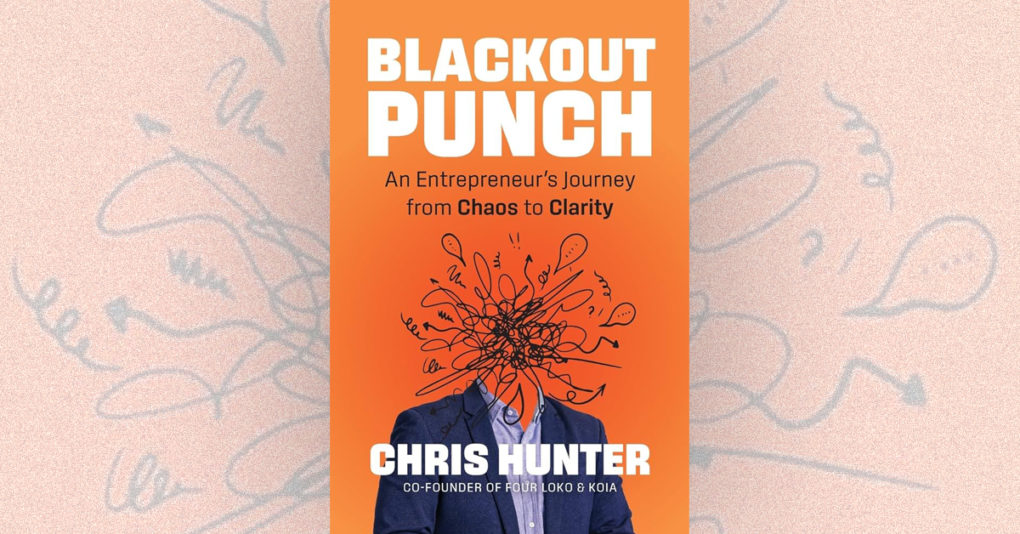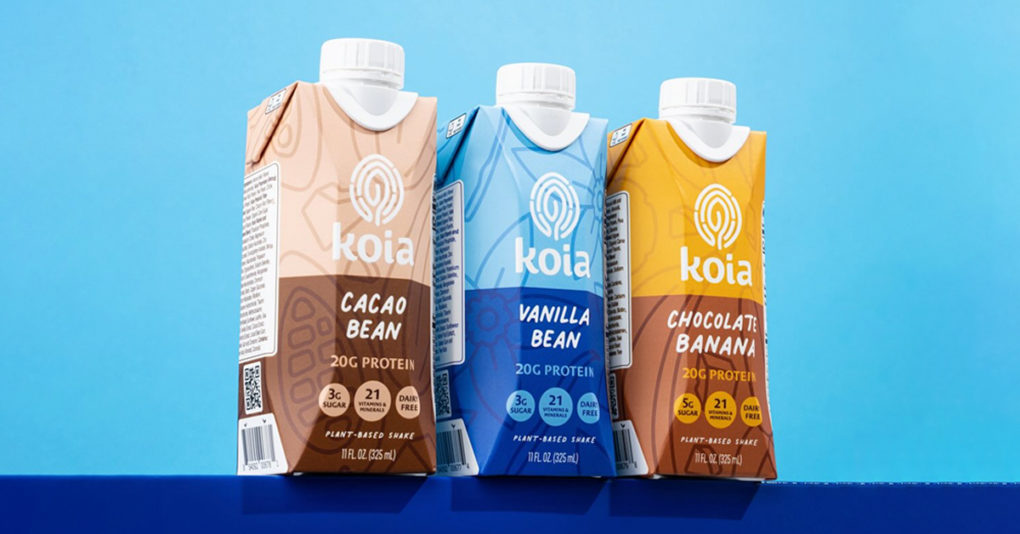Chris Hunter is well aware that his current health and wellness-oriented lifestyle and role as the CEO of plant-based protein drink maker Koia are not what anyone expected from him when he first set out to become an entrepreneur – himself included.
In the mid-2000s, bearing a public image as a twenty-something, hard-partying frat bro, Hunter co-founded Phusion Projects – the parent company of pioneering alcoholic energy drink Four Loko. Four Loko rose rapidly to a $100 million brand before becoming a lightning rod for cultural and political controversy, earning the nickname “blackout in a can” and attracting the ire of the FDA and class action lawyers.
For those who don’t know Hunter, his transition from Four Loko to Koia may seem to be a radical about face. But Hunter takes as much pride in his past successes as he does in his current projects, and though his path was tumultuous, there was a logic and drive behind it all. Now, in hopes that sharing his story can help others, Hunter has published his first book, a memoir titled Blackout Punch: An Entrepreneur’s Journey from Chaos to Clarity.
Available on Amazon, the book covers Hunter’s experiences growing up in a lower-middle class family in Youngstown, Ohio – a place he describes largely with references to classic mafia movies, where cops would buy him shots at the club at 17 – while navigating a challenging home life as his mother battled decades of drug addiction. He also discusses the early self-made side hustles that taught him how to run a business, the missteps that led to the dissolution of his friendship with his Phusion Projects co-founders, the headache of battling the U.S. government, the shock of seeing Jason Sudeikis play him on “Saturday Night Live,” and how tough love from the apparition of his late uncle during an ayahuasca trip helped him to sort his life out and set him on the path to build a cleaner, healthier brand.
We caught up with Hunter by phone to learn more about the book. This interview has been edited for length and clarity.
Why write a memoir and why now when it feels like you’re only part way through your entrepreneurial journey with Koia?
Well, that was one of the most difficult things because every time I would get to what I thought might be the conclusion of the book, there was more. Luckily, people that I had helping me brought me into the reality that the book is never finished because I’m still alive.
There was a specific time where a friend was sharing some of the struggles of something she was going through, and I try not to give advice; I try to just to share my experiences and stories. I did that, and her comment was that that really helped her and that I should write a book because it could help people. So under that heading, it got me a little bit more excited to start down that road.
It was never intended to be a how-to book; it was really just intended to share who I am, where I come from, what I’ve done: both the good and the bad, the wins and losses. The intended audience is really just my younger self, and the idea was that maybe somebody can learn from some of my mistakes or some of my progress and it could be helpful.
One of the things you talked about early in your life and your career was carrying a ‘You’re either with me or against me attitude,’ and how you don’t really feel like it served you that well in the end. How would you say your temperament to leadership and business is today compared to that earlier approach?
Early on in life I was trying to win everything at all costs. This is a bit of an extreme example, but the way I think about it is when you’re trying to eat, that’s all you can think about, right? Typical survival skills hierarchy. While I wasn’t ever at risk of not eating, you get the point.
I think as I’ve grown over time, I’ve realized that there’s a lot more benefit in win-win relationships, whether that’s with your team, or whether that’s, in this case, with retailers and with your consumers. And it’s also more fun doing things that way.
So many people in business have this kind of cutthroat ‘stab or be stabbed mentality.’ How do you put that kinder and more open listening approach into action?
One of the things I always emphasize to myself, and then to my team, is that unless we listen and ask questions we don’t really know what the problem is. I’ve found now that I’m no less aggressive in life or in business, I just approach it a little bit differently. So, I have learned to listen and really understand what problems there are.
Let’s say, as an example, for a consumer, it helps me make some decisions on things we may want to bring to life. If you’re a retailer, and I or my team understand what’s really important to them, we can then emphasize or address those things. And some of the things that may be really important to us may not be as important to them.
It just becomes more of a discussion and a real interest in understanding, based in curiosity, than it is “I’m right, and you’re wrong; how can you not see it?”
On the more personal side, you talked a lot about your extended family in the first part of the book and then mending your relationship with your parents later in life. But how did your relationships with them change during that first wave of success with Phusion? What kind of effect did the sudden wealth and attention have on those relationships?
With my mom, a lot of that time she was still in her addiction, and so it was still fractured. But it really bothered me that it turned to almost a bit of admiration, or putting me on a pedestal. It felt odd, because to me I’m still her son, or I’m still my dad’s son. I’m not somebody else that maybe the general public may perceive or make me out to be. And so that was a little bit of a transition to work through – them just understanding how to be proud without trying to make me into somebody different than who I am.
In terms of the rest of my family, my cousins who I talked about in the book, I consider them like my brothers – and the beauty of that is they’re the ones who can keep me humble. If I ever get too big-headed, they’ll bring me back to Earth and remind me that I was the crybaby kid who was attached to my mom’s hips.
You wrote about the frayed relationships with your Phusion co-founders. Going into Koia one of the lessons you took was establishing a firm hierarchy and system from the get-go. How did you manage your interpersonal relationships with your new business partners [Koia co-founders Maya French and Dustin Baker]?
I tried to be very candid coming into the relationship that I wasn’t a CEO for hire. I was actually asked by someone to come in and be the CEO of a company and that just, in my view, is not what I do and I wasn’t willing to do that.
I didn’t want to take advantage of the fact that when people are desperate, they may agree to something and then later not be happy about it. I write about the state that RawNature5 [Koia’s original name] was in at that time, so I tried to be very candid and just clear upfront because I think that’s all that anyone can ask.
It was a great relationship for the ride we had, and then ultimately they chose that it was time for them to move on to do something else and they asked to be bought out of the company, and we did that. You’d have to ask them, but I think there was respect around the fact that it was clear from day one.
I mentioned in the book that I was told “from day one, figure out how you get out when you figure out how to get in.” And while we didn’t apply that exact scenario, my point was just being very clear that I was coming in to co-found a new company that we were going to pivot, and I was going to be 100% in charge of it. I think that was clear, if not well received.
I have one last question. Did you ever get a chance to bury the hatchet with Jason Sudeikis?
Funny enough, he was training with [celebrity personal trainer] Harley Pasternak in L.A., and Harley was an early supporter and always had some Koia in his fridge. And Jason Sudeikis was training over there and was consuming it. I think it was either Maya or Dustin [who] was over there one day filling them and mentioned that Jason had spoofed me on “Saturday Night Live.”
He said, “Oh, yeah? That’s crazy, I remember that. Tell Chris that I’m giving my son the coffee Koias” – just as a joke around caffeine with the kids. So I guess that’s as close as we’ve ever gotten to burying the hatchet.

